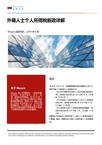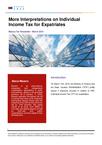
April 2019 - More Interpretations on Individual Income Tax for Expatriates
April 2019 - Interpretations on IIT for Expatriate
On March 14th, 2019, the Ministry of Finance and the State Taxation Administration (“STA”) jointly issued 3 important circulars in relation to PRC Individual Income Tax (“IIT”) for expatriates.
The Circulars are listed as:
Public Notice (2019) 34 (“PN 34”) “Criteria for the Determination of the Length of Residence of Individuals with No Domicile in China”;
Public Notice (2019) 35 (“PN 35”) “IIT Policies for non-China Tax Residents and China Tax Residents with No Domicile in China”; and
Caishui (2019) 31 (“Circular 31”) “IIT Preferential policy for selected expatriates in the Greater Bay Area in Guangdong, Hong Kong and Macau (“The Greater Bay”)”.
Bulletin
This newsletter summarizes the key points as follows:
1. Change of Basis for Counting Number of Days Staying in China for Expatriates
2. Six-year Rule Clarified
3. Computation of Income and Tax Payable for Individuals with No Domicile in China
a) Computation of Wages and Salaries received by senior management
b) Computation of Several Months’ Bonus and Stock Option
c) Computation of Tax Payable
4. Tax Treaty
5. Declaration Rules
1. Change of Basis for Counting Number of Days Staying in China for Expatriates
As mentioned in our previous circulars, one of the implications of the amendments in the IIT is that it redefines the residency of taxpayers for IIT purpose. Under the new IIT law, an expatriate would be considered as a tax resident in a particular tax year if he is physically present in China for more than 183 days in that tax year. Technically speaking, once he is considered as China tax resident, his global income shall be subject to IIT (unless he is qualified under a six-year exemption rule which we would elaborate later). Therefore, how to count the number of days in China is paramount. The past practice was that every single day that the taxpayer is physically present in China should be counted. In other words, dates of arrival and departure should be included. PN 34 now clarifies that within any single day that the expatriate stays in China for less than 24 hours, that day shall not be counted for determining 183 days in China for IIT purpose.
2. Six-year Rule Clarified
Under the IIT Implementation Rules, expatriates would be subject to IIT on their global income if the following TWO conditions are fulfilled:
- They stay in China for more than 183 days in every year in six consecutive years; AND
- They do not make a single trip outside China for more than 30 days in those six years.
PN 34 clarifies that the six years are counted from 2019 onwards. In other words, expatriates may be subject to IIT on their global income in 2025 if
- They stay in China for more than 183 years in every year from 2019 to 2024;
- They do not make a single trip outside China for more than 30 days in above six years; AND
- They still stay in China for more than 183 days in 2025.
3. Computation of Income and Tax Payable for Individuals with No Domicile in China
Circular 35 changes the computation method of IIT on time basis. The previous formulae added up global income to compute IIT payable first and then divided the same on time basis. In general, the current formula allows income to be apportioned first. Only income sourced in China and/or borne by China entities (as the case may be) is used to compute IIT payable.
Mazars provides you with:
- Computation of wages and salaries received by Senior Management
- Computation of Several Months’ Bonus and Stock Option
- Computation of Tax Payable
4. Tax Treaty
- Article of Treaty: DEPENDENT PERSONAL SERVICES
Days of stay in China | Derived within China | Derived outside China | ||
Borne by China entity | Borne by overseas entity | Borne by China entity | Borne by overseas entity | |
Less than 183 days | √ | × | × | × |
More than 183 days for each year in less than 6 consecutive years or 6 consecutive years or more with a single trip of more than 30 days outside China | √ | √ | √ | × |
More than 183 days for each year in 6 consecutive years or more without a single trip of more than 30 days outside China | √ | √ | √ | √ |
- Article of Treaty: INDEPENDENT PERSONAL SERVICES
Under the bilateral tax treaty between China and other country, an individual with no domicile in China, who is also the tax resident of the other country, may be exempted from IIT for the labor remuneration and author's remuneration in China for relevant independent personal services.
- Article of Treaty: DIRECTORS’ FEE
- Article of Treaty: ROYALTIES
5. Declaration Rules
When an individual with no domicile in China firstly declares his income with Chinese tax bureau, he shall estimate the lengths of stay in China. If the actual situation is different from the estimation, he shall:
Estimated | Actual | Solutions |
Non-Tax resident | Tax Resident | Perform the annual filing during 1 March to 30 June of the next year or before departure from China |
Tax Resident | Non-Tax resident | The individual with no domicile in China shall report to the competent tax authority after confirmation that he will not become a tax resident in China within 15 days after the end of the tax year. Tax payable amount shall be recalculated according to the non-resident situation. And the tax shall be refunded for any overpayment or paid for any deficiency. No fine for late payment will be charged. |
Stay in China for no more than 90 days (or 183 days under tax treaty) | Stay in China for more than 90 days (or 183 days under tax treaty) | The individual with no domicile in China should report to the competent tax authority, recalculate the tax payable according to the actual situation and pay the deficiency within 15 days after the end of the month. No fine for late payment will be charged. |
- Responsibilities of withholding agents
Circular 31 Preferential treatment for expatriates working in the Greater Bay
In order to promote the economic integration within cities in the Greater Bay, cities in the mainland China in the Greater Bay would provide subsidies to qualified overseas high-end talent and urgently needed talent based on the difference in IIT between mainland China and Hong Kong. The subsidy is exempt from PRC IIT. Detailed rules shall be issued by the relevant authorities in Guangdong and Shenzhen.
Mazars’ Comments
Mazars provides you with our suggestions for taxpayers and employees in China.
Download our latest tax newsletter to explore more details and read Mazars' suggestions.





